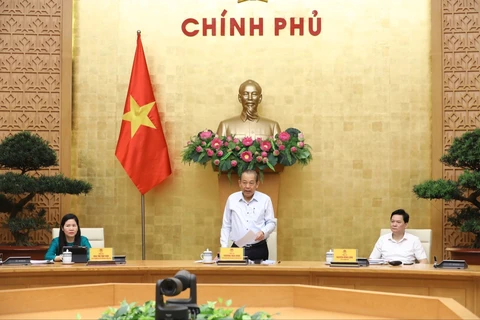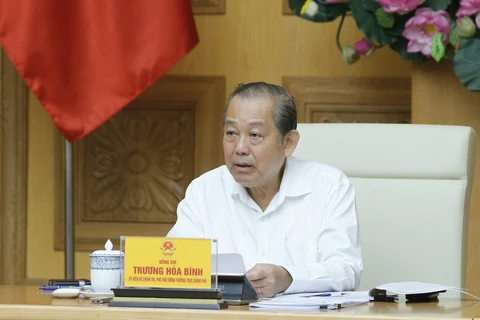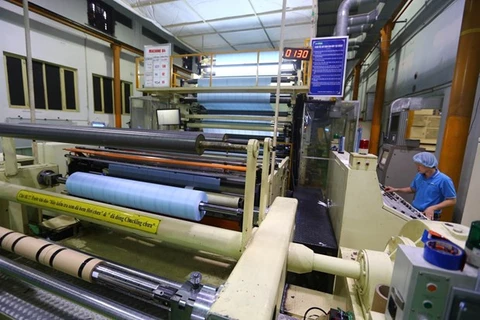 Rang Dong Light Source and Vacuum Flask JSC has applied a digital transformation strategy and increased its revenue and profit. (Photo courtesy of the firm)
Rang Dong Light Source and Vacuum Flask JSC has applied a digital transformation strategy and increased its revenue and profit. (Photo courtesy of the firm) Decision No 360/QD-TTg aims to improve the operational efficiency and competitiveness of SOEs on the basis of technology and innovation capacity, management.
The move will allow more effective mobilisation, allocation and use of social resources, while developing state capital and assets at enterprises.
Earlier, experts asked for more drastic changes as despite many efforts in restructuring and improving state-owned enterprises (SOEs), results have not been as good as expected.
According to the Ministry of Finance (MoF), in 2016-2020, 180 enterprises were equitised. However, this included only 39 out of 128 enterprises on the list approved by the Prime Minister. In 2021, three SoEs were equitized, but none was on the list approved by the Prime Minister.
Regarding the initial sale of shares, the total selling value was 22.7 trillion VND (987 million USD) or 23 percent of the plan.
The MoF said in 2016-20, 177.4 trillion VND was collected through divestment, about 6.5 times the book value.
Though several successful divestment enterprises could be listed, such as Sabeco, Vinamilk or Rang Dong, in general, only 106 enterprises divested capital according to the approval decisions of the Prime Minister, equal to 30 percent of enterprises required to do so. In 2021, 18 businesses divested capital, earning 4.4 trillion VND.
Director of the MoF’s Corporate Finance Department, Dang Quyet Tien, said that the slow progress of equitisation and divestment of state capital was due to large-scale enterprises, which owned a lot of land and the sale of state capital as well as the pandemic.
More importantly, Tien said, SOE leaders were not determined and indecisive, which has hindered the improvement of the local SOEs, which were set to serve as a fulcrum for the economy.
Chairman of the Vietnam International Arbitration Centre Vu Tien Loc said: “There is a lack of strong enterprises to play a leading role and promote the development of small and medium-sized enterprises to develop accordingly.”
Improving the scale and efficiency of enterprises
At the request to speed up the restructuring of SOEs, the MoF has developed a draft project aiming to restructure SOEs, focusing on corporations in 2021-25.
In the earlier meeting on February 14 with the Government Standing Committee on the draft project, Politburo member and Prime Minister Pham Minh Chinh told ministries and branches to focus on perfecting institutions and policies, ensuring the state economy played a leading role and State enterprises played a core role in increasing operational efficiency.
SOE restructuring must focus on solving issues at the weak and loss-making enterprises and maintaining, consolidating and developing efficient ones with good branding.
At the same time, the PM said the restructuring was a separate matter. “Don’t define the restructuring as the implementing equitisation of enterprises,” he said.
At the same time, PM Chinh ordered a simplified administrative procedure for local equitisation, in which everything must be done substantively and effectively without losing brand and corporate identity.
Head of the Ministry of Planning and Investment (MPI), Nguyen Chi Dung, said that in 2022, the ministry would focus on implementing the draft after it is approved.
He said the MPI would consolidate and develop several large-scale and effective state-owned economic groups, planning to focus on 17 large SOEs in important and necessary industries and fields for the development of the economy such as energy, industry, finance, agriculture, telecommunications and infrastructure.
Academy of Finance economist Dinh Trong Thinh told local media: “It is important that when the restructuring is done, it must completely innovate the management mechanism and separate the capital ownership and the right to manage the enterprise in the SOEs so that the enterprise can promote efficiency in production and business.
Thinh said the determination of ministries and branches was needed, adding that it was necessary to specify which industries and businesses must be restructured, divested, equitised or sold so that there would be specific plans and schedules for them./.
VNA























